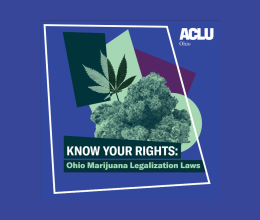COLUMBUS, OH—Today the Ohio Supreme Court ruled to continue the criminalization of individuals living with HIV. The ACLU of Ohio, The Center for HIV Law and Policy (“CHLP”), and nine other LGBTQ, HIV, medical and legal defense organizations, with assistance from the law firm Gibbons, P.C. and attorney Jeff Gamso, were amici in State of Ohio v. Batista, a case challenging Ohio Revised Code 2903.11(B)(1). Under this law, it is felonious assault – a second-degree felony – for a person who knows they are HIV positive to have sex without first disclosing their status to their sex partner.
“It makes no sense – medically or legally – to single out HIV for criminalization,” said Elizabeth Bonham, staff attorney at the ACLU of Ohio. “This law allows the state of Ohio to enter someone’s most intimate space, and control their bodies and their self-expression, based on who they are. What’s more, evidence shows us that laws like these do more damage to our communities—they don’t protect anyone.”
Laws that criminalize HIV are outdated, and ignore the scientific advances that have transformed the disease and those who are diagnosed. “We cannot allow the fears and confusion of the past to guide our current policy on HIV,” added Bonham. Ohio also has other HIV criminalization laws that attach harsher criminal penalties to some acts that carry no risk of transmitting HIV.
“This law, like all those that criminalize HIV, does not consider the actual risks of HIV transmission, how transmission occurs, or whether a person intends to transmit the virus,” said Mayo Schreiber, Deputy Director of the CHLP. Schreiber further noted “These laws do nothing to reduce HIV transmission. They neither foster behavior that mitigates the risk of transmission nor promote healthy sexual practices.”
“This decision by the Ohio Supreme Court furthers a stigma that should be relegated to history books. We will continue to work with people living with HIV and AIDS to end laws like these,” concluded Bonham.
###









